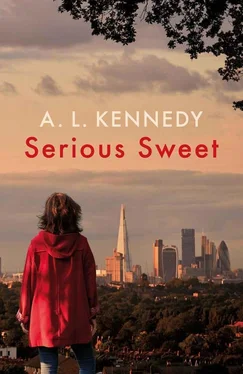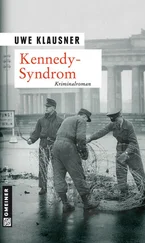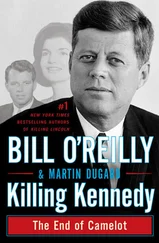The tray was still there on her coffee table, with the untried and now congealed soup and probably slightly dried bread. Rebecca lifted it all before he could stop her and told Jon, ‘I’ll make this hot again and get you some as well and then we will both eat and then you’ll go.’ She didn’t attempt to load the end of the sentence: this was simply a list of things that were going to happen.
He was forgiven, then.
Which left him to sit on the floor again, because for some reason he liked it down here, leaning back against one armrest of the sofa, and listening while there were tiny kitchen sounds: his daughter turning on the hum of the microwave, bustling, taking care of her dad.
I shouldn’t have seen Rowan last night — it’s thrown me off. The thought of someone cooking for me and busyness elsewhere and … I feel I am setting myself up for a fall.
He folded one hand around the other, clasped his palm over his fist, as if it were some live, clever stone that could help him.
Kneeling in Rowan’s bloody garden — a ridiculous thing to build, a whole garden made out of love — you can’t risk that. And I told him — stupid — told him I wanted Filya to have seen it all when everything was better and cleaned and … It’s insoluble. The waste of everything is beyond me.
I can’t say.
Jon rocked while some horrible shadow swung through him and he just …
I used to be, used to be a man who was all about preparing for solutions, about showing other people where solutions might be found and how they might be implemented. One can’t change one’s nature, particularly not if some element of it is functional and — one believes — beneficial and worthwhile. I can’t stop doing what I feel is necessary, not without changing myself and …
Jon heard Becky come back, her bare feet over the boards and the little slips of the spoon as it rocked against the bowl — he could picture it all, but not lift his head. He felt her shin rest against his side and press.
‘Dad?’
‘Yes. Yes. Yes.’ This was meant to be the start of a longer statement, but instead he could only agree to being her father. ‘Yes.’
‘Dad, you’re crying. Why are you crying?’
And now she has let him discover that he is — yes — crying, the force of it sparks in his lungs and almost chokes him and he can’t tell her why.
Even when she sets the tray down on the floor — or somewhere, just somewhere, he doesn’t see where, can’t see where — even when she kneels and holds him round his breathing, pins his arms in to his sides in a way that makes him drown slightly, just a bit — even then he can’t tell her why he is crying.
Because nothing is soluble any more.
Because it’s all ruined.
Because I am ruined.
Because an extraordinary woman called Filya is dead.
Because I never loved your mother properly.
Because I never loved you properly.
Because I am going to lose my job.
Because I am going to be destroyed.
Because I have a girlfriend.
I can’t.
Because I have never saved anyone.
Because I have tried and never managed to be as I should, act as I should.
Because I have Meg, but I can’t have Meg.
I can’t.
Here it is.
But, really, I can’t.
He kept on holding his own hand.
WELL FUCK THAT, though. I’m better than that. My name is Meg and I’m better than that — which is what people say, ‘I’m better than that,’ and I’m not very sure what it means, or how they’d know, but why not think it anyway, it sounds friendly.
I can imagine, I can assume that I am better than being in a pub and feeling lousy and wanting to do what any normal human being should do in a pub.
So fuck that. Fuck normal.
I’m not normal.
I’m better than that.
Meg had left the bar and was heading down Charing Cross Road, which was undoubtedly better than some things and some places, but not exactly at its best.
Although you never know with Charing Cross Road what its best is meant to be.
Its shops always managed to seem not quite in working order, a bit rubbish and quiet. Or else sleazy. It had an aura of louche dysfunction. Chinatown was a block away and doing its restaurants and stacks-of-vegetables-in-boxes and busyness thing, but Charing Cross Road wasn’t Chinatown. And just round the corner in Denmark Street were classy guitars and hard-fingered experts and hopes and prayers for the dispensation of blue, blue coolness — so Meg was told — but Charing Cross Road just wasn’t Denmark Street. And Soho was right over there and doing its clubs and raunch and posing and out-of-your-mind-on-whatever and up-all-night and no-knickers thing — but that wasn’t Charing Cross Road, either. Charing Cross Road was all shoddy offers and empty bookshops and tourist tat and places where you wouldn’t eat and shouldn’t drink.
It’s OK, the stuff doesn’t jump out and grab you, it doesn’t get forced down your throat — lots and lots of grown-ups have told me that.
And there were too many theatres around here. Maybe it was the theatres that gave the place its unreliable vibe. Theatres wanted nothing to do with you most of the day and then they lit themselves bright and liked to be all straggled round by dressed-up crowds and queues. Then every trace of that got tidied away, shut in behind doors. And the same crowds were leaving, out again, two or three hours later and you’d no idea what went on in between, except that it made them seem smug and overheated. And the people who worked for the theatres leaned about across interesting doorways and looked purposeful near trucks full of equipment and mysteries and they kept odd hours and encouraged odd hours in others: late eating, early eating. They kept to an alcoholic’s schedule: late drinking, early drinking. That was maybe why Meg hadn’t been this way in a while.
There was a greasy-spoon place just off Leicester Square where she used to get breakfast in the tiny hours of semi-regular, irregular mornings. If you’d had to make a night of it and wanted propping up — there it was.
Charing Cross Road was built for visitors in ideas of their Sunday Best, for pickpockets and lost sheep and bookworms and the people who acted as warnings against the risks of eating through your lifestyle. Asleep in doorways, ill in doorways, can’t-tell-if-they’re-dead-already in doorways — they were your examples to learn from, the sketches from your future. You see the other options — the ones on the way to soup kitchens and shelters, theatrical about their misery, wearing it out loud. Charing Cross Road was always there but for the grace of God.
Whoever that is.
This evening she was glad when she could get herself down in the Underground and away.
Where no one can call me. I don’t really want another call.
I mean, I do. But I don’t want be waiting for it, or waiting for another failure, or …
There are things that I can’t manage in my thinking. Not today.
Maybe forever.
The subway hadn’t been a friend to Meg when she was drinking: the inescapable white passageways, bowing out as if she had been Jonahed, taken deep inside the whale. It had made her sweat.
Jon wrote about being Jonahed — I never thought of it before as a word.
She hadn’t enjoyed the branching muddle of directions, the sudden lock of crowds around you, the delays and the fuggy trapped air — or the unexplained sudden assaults of feral pressure, gusts from nowhere which might be normal, or a sign of accidents and collapses. The roar of the tunnels once she’d got aboard a carriage could be unbearable — so much velocity, so much unnatural submersion, so many people to peer at you and find you wanting and shaking and damp.
Читать дальше












